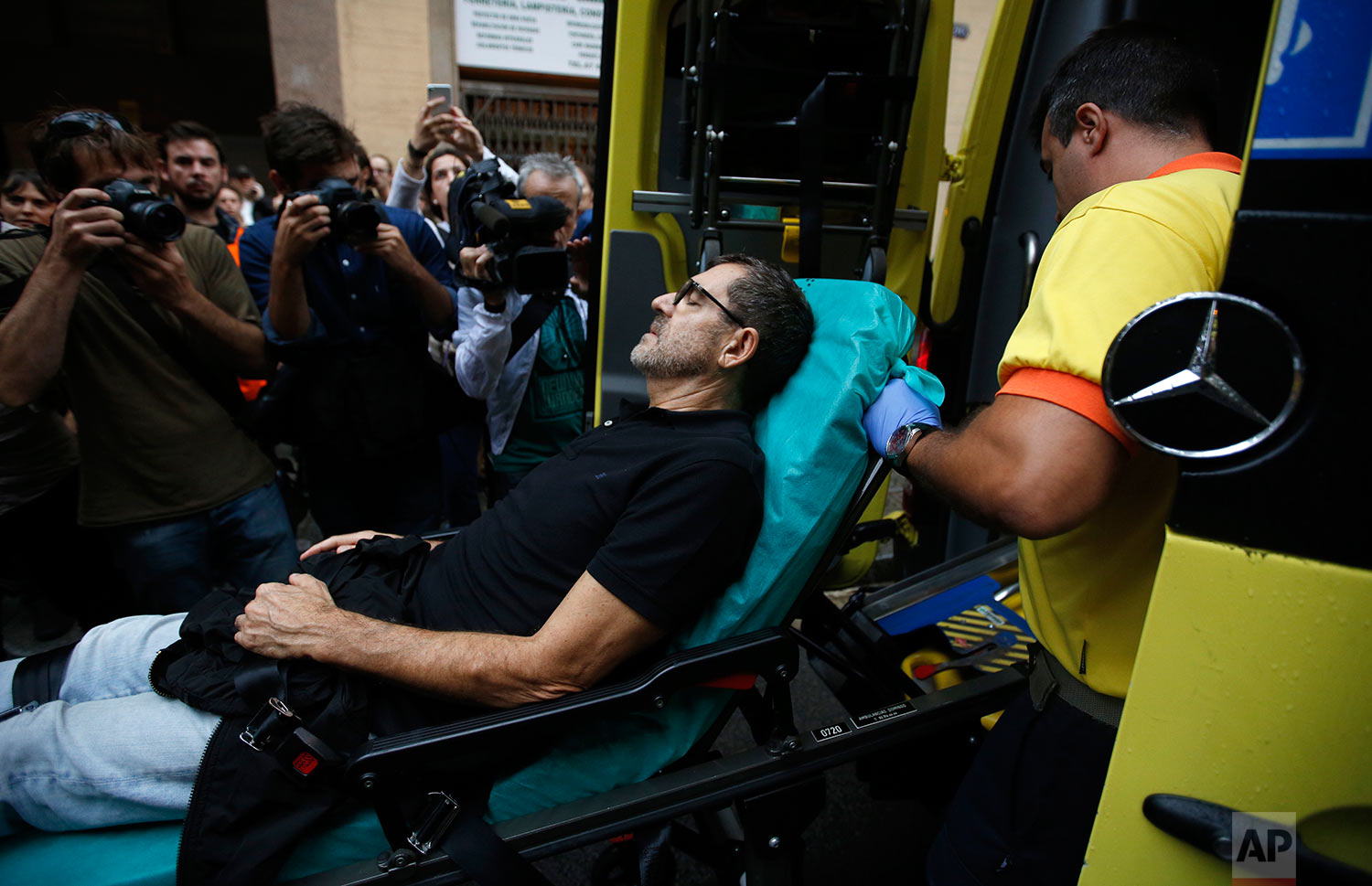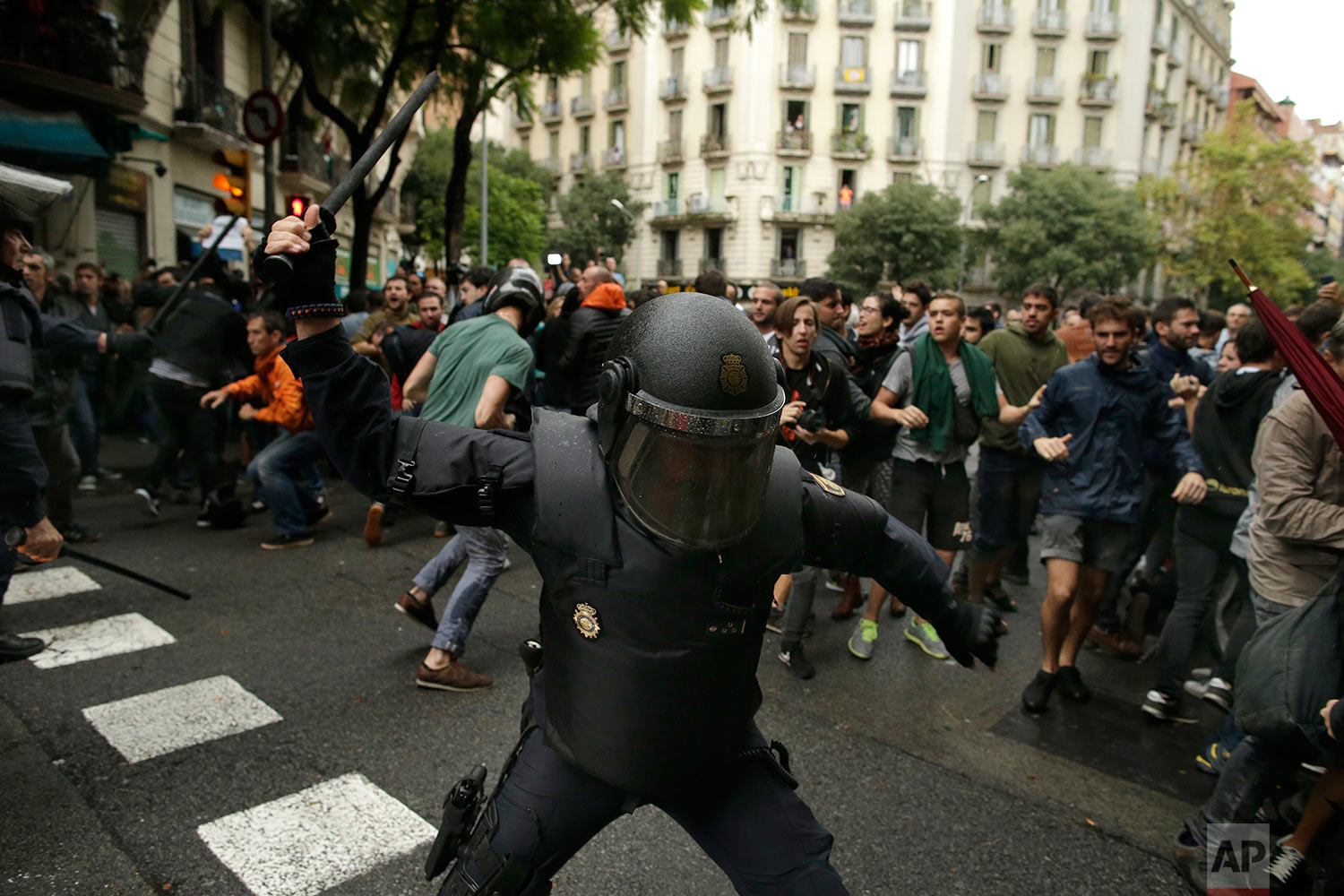Melee in Catalonia as Spanish police violently attack voters

Spanish riot police smashed their way into Catalan polling stations Sunday to try to halt a disputed referendum on independence, firing rubber bullets and attacking voters who were trying to stop them from confiscating ballots. The daylong melee injured at least 761 civilians and 11 police, authorities said.
People confronts Spanish riot police near a voting site at a school assigned to be a polling station by the Catalan government in Barcelona, Spain, Sunday, 1 Oct. 2017. Spanish riot police have forcefully removed a few hundred would-be voters from several polling stations in Barcelona.(AP Photo/Felipe Dana)
The officers fired the rubber bullets while trying to clear protesters who were trying to prevent National Police cars from leaving after police had confiscated ballot boxes from the voting center. The Spanish government has ordered police to stop the voting process in Catalonia, saying it’s illegal.
The chaotic confrontations led to a war of words as each side blamed the other for the deteriorating situation.
Spanish National Police prevents people from entering a voting site at a school assigned to be a polling station by the Catalan government in Barcelona, Spain, Sunday, 1 Oct. 2017. (AP Photo/Emilio Morenatti)
“Police brutality will shame forever the Spanish state,” Catalan President Carles Puigdemont said as crowds cheered.
Top Spanish officials defended the police actions.
Police acted with “firmness and proportionality,” declared Spanish deputy prime minister Soraya Saenz de Santamaria, adding that authorities weren’t going after voters but referendum material.
She accused the Catalan government of gross irresponsibility in staging the vote.
“There hasn’t been a referendum or the semblance of one,” she said.
A girl grimaces as Spanish National Police pushes away Pro-referendum supporters outside the Ramon Llull school assigned to be a polling station by the Catalan government in Barcelona, Spain, early Sunday, 1 Oct. 2017. (AP Photo/Emilio Morenatti)
Tensions have been on the rise since the vote was called in early September, crystalizing years of defiance by separatists in the affluent region, which contributes mightily to Spain’s economy. As one of Spain’s 17 autonomous regions, Catalonia enjoys ample rights but key areas such as infrastructure and taxes are in the hands of Madrid. Separatist Catalans have long complained the region is contributing too much to the state while not getting enough in return.
Catalonia’s government spokesman said 337 people have been injured, some seriously, during the police crackdown Sunday and Spain’s Interior Ministry said 11 police officers were injured.
Spanish riot police removes fences thrown by people to them as they try to prevent people from reaching a voting site at a school assigned to be a polling station by the Catalan government in Barcelona, Spain, Sunday, 1 Oct. 2017. (AP Photo/Felipe Dana)
The regional government’s spokesman, Jordi Turull, blamed the violence directly on Spanish Prime Minister Mariano Rajoy. He said actions by Spanish National Police and Civil Guard forces on Sunday were politically motivated and showed “a clear motivation to harm citizens.”
Catalan international affairs director, Raul Romeva, said regional authorities would appeal to European authorities to examine the violations of human rights by Rajoy’s government.
Manuel Condeminas, a 48-year-old IT manager who tried to block police from driving away with the ballot boxes, said agents had kicked them before using their batons and firing the projectiles, which were ball-shaped.
People sits in the middle of the street to block Spanish riot police near a voting site at a school assigned to be a polling station by the Catalan government in Barcelona, Spain, Sunday, 1 Oct. 2017. Catalan pro-referendum supporters vowed Saturday to ignore a police ultimatum to leave the schools they are occupying to use in a vote seeking independence from Spain. (AP Photo/Felipe Dana)
Elsewhere, Civil Guard officers, wearing helmets and carrying shields, used a hammer to break the front door glass and a lock cutter to break into the Sant Julia de Ramis sports center near the city of Girona. At least one woman was injured outside the building and wheeled away on a stretcher by paramedics.
Clashes broke out less than an hour after polls opened, and not long before Catalonia regional President Carles Puigdemont was expected to turn up to vote at the sports center. Polling station workers inside the building reacted peacefully, breaking into songs and chants challenging the officers’ presence.
A protester is attended after being hit by a rubber bullet shot by Spanish National Police near the Ramon Llull school assigned to be a polling station by the Catalan government in Barcelona, Spain, early Sunday, 1 Oct. 2017. (AP Photo/Manu Brabo)
Puigdemont was forced to vote in Cornella de Terri, near the northern city of Girona, his spokesman told The Associated Press.
The Spanish government and its security forces are trying to prevent voting in the independence referendum, which is backed by Catalan regional authorities. Spanish officials had earlier said that force wouldn’t be used, but that voting wouldn’t be allowed.
People vote at the Escola de la Concepcio, a school assigned to be a polling station by the Catalan government, in Barcelona Sunday, Oct. 1 2017. The Spanish government and its security forces are trying to prevent voting in the independence referendum, which is backed by Catalan regional authorities. Spanish officials had said force wouldn't be used, but that voting wouldn't be allowed. (AP Photo/Manu Fernandez)
Spain’s Constitutional Court has suspended the vote. Regional separatist leaders pledged to hold it anyway, promising to declare independence if the “yes” side wins, and have called on the region’s 5.3 million eligible voters to cast ballots.
Police had sealed off hundreds of voting centers in the hours before the vote to prevent their use. Others were filled with activists determined to hold their ground.
A man shows a ballot paper as Spanish National Police blocks people from approaching the Ramon Llull school assigned to be a polling station by the Catalan government in Barcelona, Spain, early Sunday, 1 Oct. 2017. Catalan pro-referendum supporters vowed to ignore a police ultimatum to leave the schools they are occupying to use in a vote seeking independence from Spain. (AP Photo/Emilio Morenatti)
At one school in Barcelona, Spanish riot police forcefully removed a few hundred would-be voters from a polling station. Daniel Riano was inside the building when the police pushed aside a large group gathered outside and busted in the Estela school’s front door.
“We were waiting inside to vote when the National Police used force to enter, they used a mace to break in the glass door and they took everything,” the 54-year-old Riano said. “One policeman put me in a headlock to drag me out, while I was holding my wife’s hand! It was incredible. They didn’t give any warning.”
A woman cries after civil guards dragged people away from the entrance of a sports center, assigned to be a referendum polling station by the Catalan government in Sant Julia de Ramis, near Girona, Spain, Sunday, Oct. 1, 2017. Scuffles have erupted as voters protested as dozens of anti-rioting police broke into a polling station where the regional leader was expected to show up for voting on Sunday. (AP Photo/Francisco Seco)
National Police and Civil Guard officers also showed up in other polling centers where Catalan officials were expected.
Catalans braved rain to vote and defied police orders to abandon designated voting stations.
Joaquim Bosch, a 73-year-old retiree at Princep de Viana high school, where a crowd was growing Sunday morning, said he was uneasy about a possible police response.
Civil guards clear people away from the entrance of a sports center, assigned to be a polling station by the Catalan government in Sant Julia de Ramis, near Girona, Spain, Sunday, Oct. 1, 2017. Scuffles have erupted as voters protested as dozens of anti-rioting police broke into a polling station where the regional leader was expected to show up for voting on Sunday. (AP Photo/Francisco Seco)
“I have come to vote to defend the rights of my country, which is Catalonia,” Bosch said. “I vote because of the mistreatment of Catalonia by Spain for many years.”
AP reporters saw ballot boxes wrapped in plastic bags being carried into some of the polling stations in Barcelona that were occupied overnight by parents and activists. The plastic ballot boxes, bearing the seal of the Catalan regional government, were placed on tables, prompting cheers from hopeful voters who had gathered in the schools before dawn.
Spanish National Police officers in plain clothes try to snatch a ballot box from polling station officials at the Ramon Llull school assigned to be a polling station by the Catalan government in Barcelona, Spain, early Sunday, Oct. 1, 2017. (AP Photo/Manu Brabo)
In an effort to overcome the determined Spanish police efforts, Catalan officials announced that voters would be allowed to cast ballots in any location and could use ballots printed at home.
Regional government spokesman Jordi Turull also said a group of “academics and professionals” had been invited to serve as election observers. The official electoral board appointed by the regional parliament was disbanded last week to avoid hefty fines by Spain’s Constitutional Court.
“We are under conditions to be able to celebrate a self-determination referendum with guarantees,” Turull said in a press conference. “Our goal is that all Catalans can vote.”
Courts and police have been cracking down for days to halt the vote, confiscating 10 million paper ballots and arresting key officials involved in the preparations. On Saturday, Civil Guard agents dismantled the technology to connect voting stations, count the votes and vote online, leading the Spanish government to declare that holding the referendum would be “impossible.”
Here is a look at what happened in the last 24 hours leading up to today's unrest in Barcelona:
Text from the AP news story, Spanish police fire rubber bullets near voters in Catalonia, by Aritz Parra and Joseph Wilson.
Associated Press writer Alex Oller contributed to this report from Barcelona, and Gregory Katz and Frank Griffiths contributed from London.
Photos by Emilio Morenatti, Felipe Dana, Manu Brabo, Manu Fernandez, Francisco Seco, Santi Palacios, and Alvaro Barrientos
Visual artist and Journalist




























